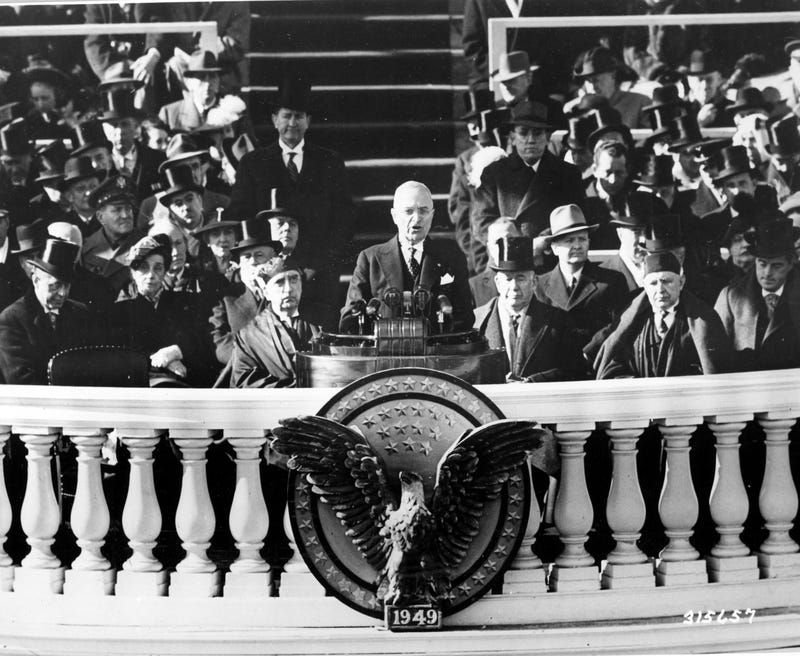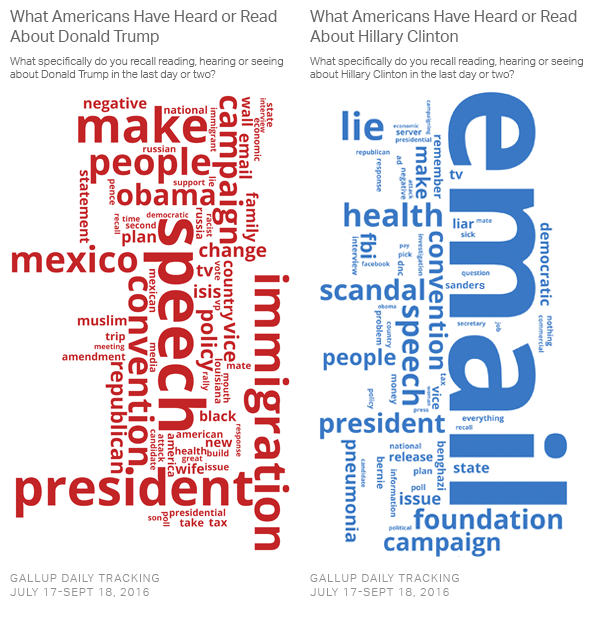Election Countdown, 243 Days to Go: Four Mysteries After ‘Super Tuesday.’
The field is narrowed down to Biden and Trump. The press has been telling us that both these guys are losers, for different reasons. Somehow one of them is going to win.
Harry Truman giving his inaugural address on January 20, 1949, after being sworn in for his second term. Barring the unforeseeable, next January either Joe Biden or Donald Trump will be sworn in for a second term. Biden is hoping to follow Truman’s example of winning re-election after being counted out by the press. (Truman Library photo.)
Here are four puzzles about the presidential election, with Super Tuesday just behind us and the “real” campaign kicking off with Joe Biden’s State of the Union Address tonight. My purpose is to outline the four now-unanswerable questions, then add my guesses.
1) How can either of these candidates win?
Through the months a dominant press theme has been: This is the rematch nobody wanted.
The premise of “nobody wanted this” is that voters are tired of both these people, Biden and Trump. But so far the press has presented the discontent in strikingly different ways:
On Trump’s side, his drawbacks have been assumed away as givens—‘asked and answered,’ as the trial lawyers would say. Each new indictment, each new multi-million dollar fine or negative verdict, each new insult or transgression has been reported mainly for how it might further motivate the MAGA base.
On Biden’s side, his achievements have been assumed away as givens. Each new negative poll, each new report about Biden’s age, each new interview with one-time Democrats who now feel disappointed has been reported for how it erodes his hopes for re-election.
There is no clearer illustration of the difference in coverage than the this pair of New York Times headlines in yesterday’s analysis of Super Tuesday:
Joe Biden won an overwhelming share of the Democratic vote, but was “bruised.” Donald Trump lost much more of the Republican vote, but was “unstoppable.”1
I have thought all along, and written here several times, that election-year fundamentals are more strongly in Biden’s favor than relentlessly downbeat coverage would suggest.
-On his side: a Democratic party fully as unified as that backing Barack Obama and Bill Clinton in their re-election runs; a more robust economy than for either of them; a stable and virtually scandal-free administration; and a Republican party being pulled toward its electoral-poison extreme rather than toward the center.
Also on Biden’s side is the dismal Trump/MAGA election record in virtually all contests since the fateful one that brought him to the White House. Almost every time Trump and his acolytes have been exposed to a “real” electorate, not just MAGA believers, they have lost.2
-But working against Biden, as we hear every day, are sagging polls, sinking popularity, mounting age. And of course a relentless focus on his every mis-step.
Here’s the point I’m getting to: Looking at press coverage, you would conclude that Joe Biden can’t win. Looking at basic facts, you would conclude that Donald Trump can’t either.3
But one or the other will. Today I saw the first little glimmer of press accounts explaining how the contradiction might be resolved. It was a NYT politics story with the headline, “How Trump’s Crushing Primary Triumph Masked Quiet Weaknesses.” It included this revelation: “Mr. Trump’s inability to broaden his support stands among the biggest threats to his party’s efforts to reclaim the presidency.”
Indeed. This is part of what Team Biden has been saying all along. (As Evan Osnos conveyed in this latest New Yorker piece.)
Will overall press coverage shift to this bigger picture—and to what is at stake in the election, not just what is in the sub-tabs in the latest polls? Who knows. But my guess is that, for variety’s sake if for no other reason, we might start hearing more about the obstacles ahead for Trump.
2) Does press coverage and expert ‘framing’ even matter?
I’m saying that mainstream coverage has been consistently too pessimistic about Joe Biden and his prospects. For instance, with the front-page stories one day before the 2022 midterms declaring that the Democrats were “bracing for losses” in an impending “red wave,” and that their party’s outlook was “bleak.”4
Given the Democrats’ success in those midterms, and in most off-year elections since then, does press “framing” even matter? Won’t the fundamentals finally prevail? And given how few people follow the news at all, let alone ever see a newspaper’s front page, why should we even care what editors choose for headlines?
The strongest recent evidence that there’s a trickle-down effect of press framing is the famed Gallup word cloud, of what the electorate had heard about both Donald Trump and Hillary Clinton eight years ago. I think the evidence still shows that what’s in the elite papers affects what’s online and on TV and generally in the air—even in an era of weaponized disinformation, even in social media swamping all other information sources.
If Gallup had produced a word cloud of political coverage to date, I bet that the Biden column so far would be dominated by TOO OLD, just like EMAIL for HRC. Trump’s would be some mixture of ILLEGAL IMMIGRANT and GREAT AGAIN and REVENGE and INDICTMENT.
Will it matter this time, as much as it did eight years ago? The Democrats’ success in recent elections has been in spite of press framing, and apparently built on voters’ attention to fundamentals. These have included reproductive rights, democratic institutions, public investments especially in declining and left-behind areas, and a background of economic growth.
My guess is that once again the fundamentals will prevail—as they do most times, though not in 2016. But in close races the framing can make a big difference, and this outcome could be close.






